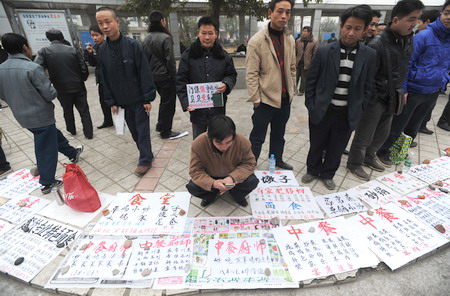Top Biz News
Migrant workers stay home
By Chen Limin and Andrew Moody (China Daily)
Updated: 2010-02-25 09:31
 |
Large Medium Small |
 |
|
An employer (center) representing local restaurants waits for job seekers yesterday at a labor market in Chengdu, Sichuan province. Increasing employment opportunities in areas which traditionally exported workers are leading to labor shortages in manufacturing hubs such as the Pearl River Delta. [China Daily] |
He said the only way to attract workers now is to offer inducements.
"We have no choice but to offer a salesperson about 1,200 yuan per month, and insurance worth almost 400 yuan, and provide them free boarding and lodging," he added.
"Five years ago, notices were posted in railway stations saying, 'Don't bring your fellow townsmen here' because there were just too many workers in Guangdong. We could pick and choose, but not anymore," he said.
|
||||
According to a survey by the Zhejiang team of the National Bureau of Statistics, 52 percent of companies in the province expect a hard time filling jobs after the Spring Festival.
In Wenzhou, an industrial city known for its small- and medium-sized enterprises, the labor shortage may reach 800,000 to 1 million, said Zhou Dewen, vice-president of the China Association of Small and Medium Enterprises.
"The prospect of a higher wage bill is not the only increasing cost they face," he said, adding land and raw material prices are going up.
"The only way forward for them will be to invest in technology and move up the value chain. They will then be able to pay higher wages."
Zhong Jiyin, an economist at the Chinese Academy of Social Sciences, said the labor shortage will affect the performance of manufacturers in the short term.
"It is a real problem at the moment. In the longer term, however, manufacturers will have to upgrade their technology. That is the only way they will survive in the export markets in the longer term," he said.













